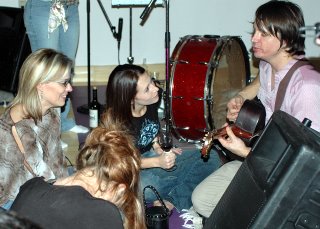
Ian Moore at 36 has mellowed. Still unique, far from ordinary, he’s leading his passionate pursuit of music around the country. Thinking back on Dallas and Austin, wondering when he’d make that one great album, he joined DMG for an evening of candlelight and quiet conversation at
Surrounded by the aroma of patchouli, candlelight, and the simple Zen décor of
Ian Moore: I have a harder time in
DMG: I don’t think they have.
IM: Well, in
DMG: Yeah, I can definitely see that. You mentioned in conversation, at your show in December at the
IM: Well, I don’t know. It doesn’t exist within the community that I’m aware of. There may be. I’m sure there are always new groups of bands. But I don’t see a lot of interplay between
DMG: I hope that’s changing. But it would have to start again, and it doesn’t exist right now. I think there’s a little bit (of interchange) but I don’t think there’s much.
IM: Well, they’re very different communities. People that live in
DMG: When you were playing before, you knew a lot of bands in
IM: Yeah, tons. I did shows with Ten Hands, To The New Bohemians, Mike Dane who was in a couple of bands. We used to play with and stay with them, all hang out and it was just a very tight community. I notice there’s a very tight community in
DMG: Right now or previously?
IM: I really don’t know because most of the bands that I’m aware of from North Texas are from
DMG: Yeah, they just broke up.
IM: Yeah, I saw that. That’s the world that I’m aware of. Most of these bands are from
DMG: You also mentioned that when you were starting out in
IM: Well, no, just my influences and where music’s at now, it’s much cooler. The kind of stuff I was into then is considered much cooler now. It wasn’t cool to be arty back in those days. (The
DMG: What’s your favorite ‘50s band?
IM: Well, my favorite musician in modern music is probably Buddy Holly. Just love him. He’s the basis of everything. So much of the Beatles is Buddy Holly. Especially the stuff that I think eventually morphed into their experimental side. He was so experimental; people don’t realize that. They think of the ‘50s and they look at him and he’s just like Elvis. But he did things like playing drum parts on his knee. People didn’t do stuff like that. Especially to think that he was recording in
DMG: Do you feel more at home in
IM: So much of my life has been traveling that I really don’t feel home in a place, I feel home amongst different groups of people. It’s not so much a material place. I really like where I live, and I spent a lot of time in Texas, so I don’t really feel like I’ve necessarily moved, because I’m really not gone any more than I was back then.
DMG: What was growing up like for you? You had a pretty cool childhood, didn’t you?
IM: Well, yeah. Definitely did some cool things. Folks were cool, got to travel a lot, surrounded by a lot of really interesting people. But also, it was really hard because growing up in the ‘70s in
DMG: Like polar opposites coming together.
IM: They were. That was the beauty of the ‘60s; so many cultures that really hadn’t meshed that often were intertwined. My mom came to
DMG: In your music, it seems as if there are two groups of people in your world. One, the ordinary souls, the rest of us that lead lives of quiet desperation, and the others…
IM: (interrupting) I’m making fun of myself, by the way. It’s a jab at feeling like you’re different, actually. It’s the Randy Newman school of thought; you put out something ridiculous enough that makes you look like a real asshole, like ‘Short people got no reason to live.’ That song’s obviously an irony. Put it out for other people to grab. I’m not that pretentious to think I would write a song like that. Well, I mean, I can’t… (shakes head).
DMG: What?
IM: Well, it’s just funny. I remember fans of mine mailing, ‘What does Ian have against fat people?’
DMG: Why? (laughs) Because all your ‘friends are pretty and thin?’
IM: My friends aren’t like that. I live on an island, I’ve got two kids, I garden and cut wood. I don’t hang out with a bunch of fuckin’… you know, those are not my friends. I actually don’t hang out with people like that. A lot of my friends are like Borkowski characters and the rest are Mormons; I’m a little bit somewhere between. Really, it’s not… I don’t have that many rock-n-roll friends.
DMG: Here in
IM:
DMG: Do you think they are still rebelling against how wild their parents aren’t?
IM: I don’t know. I don’t know, but I don’t understand it. I don’t like staying in places like that because I like to sleep at night. I don’t want to live in a frat party. I know when I was young and I would date girls, their parents would always be really wigged out at first and I was always like, ‘Judge me as a human being, see what I’m like.’
DMG: Yeah, everyone is bummed you cut your long hair.
IM: (shakes head, laughing) Isn’t that sad?
DMG: Well, you had good hair.
IM: I mean, think about that for a second.
DMG: It’s like your hair defined you.
IM: (sarcastically) Yeah. That is… that is ridiculous. I mean, it would have been one thing if I had grown up in Teen Beat magazine and I’d ascribed to that. That the length of my hair has anything, in any way, to do with the music that I’m doing is something that I can’t even conceptualize.
DMG: It’s the outward appearance, the easy Cliff Notes to ‘this is what he must be like on the inside.’
IM: People need to work on their imaginations.
DMG: What image do you think you’re broadcasting these days?
IM: I have no idea. I don’t know. I have no idea. I like Paul Weller (The Jam, Style Council) a lot. I’d like to look like him, but I don’t. So, I have no idea.
DMG: I have to ask you about a lyric: “I live a life, that’s what it is.” There two meanings to that lyric.
IM: Yeah.
DMG: How did you mean that?
IM: Both ways. Too many people go through life and they just get by. But I know the truth.
DMG: Can you tell me a little bit more about that?
IM: My life is a life that I live. So many people talk about the nature of life: ‘So how was your tour?’ or ‘How are you doing?’ Those kind of things that you already know what the answer is going to be before you ask it, most of the time. Probably some good stuff happened, some bad stuff happened; I was tired, I had a few good gigs, some bad gigs. People are either enthralled by my life and totally romanticize it or, and this happened the last time I was here, this girl came up after the show, because I was talking about my kids from the stage, she said, ‘I think it’s really arrogant of you to be on the road and to be away from your family and to be playing music. You need to put your children first, before anything.’ I said, ‘I agree with you, and I do, and you don’t know anything about my life.’ So she was coming from the opposite space of her perspective of what I don’t have, instead of the fact that every path that you take is a series of pluses and minuses and you make choices to change the path you’re on, depending on what you want to do in your life.
DMG: You’ve said that if you’re home, you sometimes get frustrated and want to get back out on the road.
IM: I don’t so much want to get back on the road, I just want to… You know, I’m thirty-six years old, and I still feel like I haven’t really made a great record, the record that I want to make. I try not to get into the thing of being in a race with time, but I do know that it gets harder and harder in some ways. The great irony of acquiring wisdom is that there are less and less people to share it with because wisdom is an individual pursuit. And you gain your thing and it separates you from people. I’m on my own path and I don’t have a lot in common with a lot of people the older I get, whereas when I was younger and I had less life experience, it was easier for me to be part of a group.
DMG: But thirty-six? That’s young, that’s just starting.
IM: Well, I know. I don’t feel old that way, I feel old in the fact that most people in their thirties have completely given up on a creative life. They’ve just accepted it, through having kids. I see the struggles; it’s hard, it really is difficult. I’m a chef, I love to cook, but when I’m not home, my wife very rarely cooks because the kids aren’t gonna want to eat it. Who’re you going to cook for? And do you really have the time to spend the time to cook? Then at the end of the day, you’re psychically so tired, it’s much easier to sit in front of the television and watch a sitcom which deadens your brain and your soul, than it is to write or sew or create. But you can’t shut people down, the energy inside comes out some way. You need to feel fulfilled as a soul. Some people fool themselves and have a nervous breakdown at forty-five or fifty, shut down by societal interaction. So, when I’m home for a while, I get the urge to dive in and use my time to do something that I’m hoping is going to be great. Which I know is the carrot I’m never going to catch. That’s the pursuit of art.
Ian Moore returns to the new location of Poor David’s Pub by South Side Lamar on Sunday, January 23rd for an evening that may be a little less intimate, but just as creative. His latest album, Luminaria, is a beautiful, folksy ride thorough his gothic world. Just the perfect listening material for a Sunday.
Originally published © 2005 Dallas Music Guide







No comments:
Post a Comment